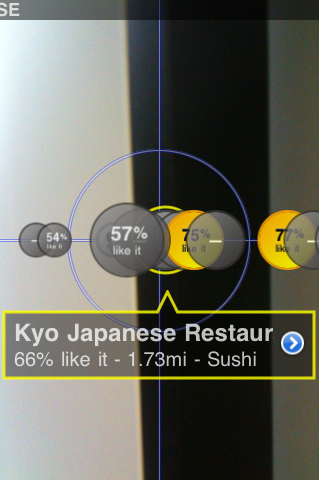Battle Of The Augmented Reality Apps: Urbanspoon, Layar, Wikitude, WhereMark & More
There seems to be an explosion of “real-time” search engines on the PC. The space is very new, still fairly open and in my opinion the tools and sites are not yet all that useful. Almost exactly the same can be said of “augmented reality” (AR) in mobile. From almost nothing about six months ago, […]
There seems to be an explosion of “real-time” search engines on the PC. The space is very new, still fairly open and in my opinion the tools and sites are not yet all that useful. Almost exactly the same can be said of “augmented reality” (AR) in mobile.
From almost nothing about six months ago, there’s now an explosion of AR apps for Android and the iPhone. They’re cool, they’re novel but most of them are not that useful as a practical matter.
As I wrote previously, AR is a form of search. However the best AR apps incorporate more conventional methods of searching and discovery that don’t rely on the camera or use AR to complement their existing app (i.e., Yelp, Urbanspoon).
Indeed, Urbanspoon (now part of Citysearch/IAC) just released an app update that includes AR for the iPhone 3GS. Called “Scope” it shows a tab at the bottom of the screen that launches the camera-based experience. Hold the phone up and through the camera you see the popularity of restaurants and distance, indicated by the size of the circle (image below). If you point the phone toward the ground, you’ll get a traditional map instead. You can also manually locate yourself for greater precision (so that you can see the restaurants immediately near you) if GPS isn’t working well.
The iPhone (following Android) also recently saw the arrival of AR “browsers” Wikitude and Layar, which incorporate lots of third party data and services. And there’s also new AR “platform” WhereMark for the iPhone.
[youtube]https://www.youtube.com/watch?v=Y4MfQ8xehME[/youtube]
There are now at least a dozen apps that offer varying degrees of augmented reality through the camera lens. These tools generally work well as a way to discover information about locations immediately around you or to quickly learn more about a place or object immediately in front of you. However AR can be quite awkward in many instances and, at least at this point, is not an all-purpose substitute for more “traditional” mobile search.
In time AR will find its place — and it will — in the mobile universe. Like voice interfaces AR is a search and discovery tool that is uniquely tailored to the mobile handset and not simply imported from the PC. But interestingly, we’re also starting to see AR make its way onto the PC experience in some ways (in Google Maps for example).
Contributing authors are invited to create content for Search Engine Land and are chosen for their expertise and contribution to the search community. Our contributors work under the oversight of the editorial staff and contributions are checked for quality and relevance to our readers. The opinions they express are their own.
Related stories
New on Search Engine Land


